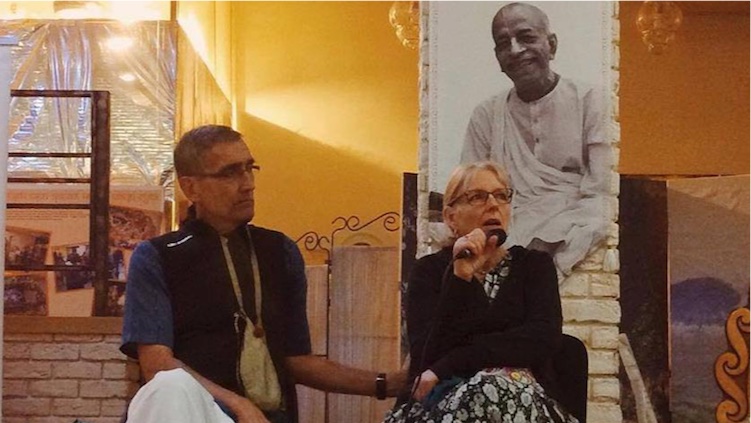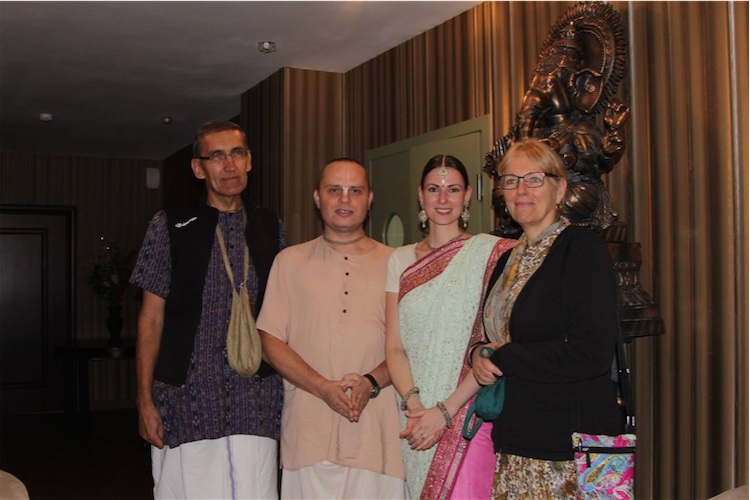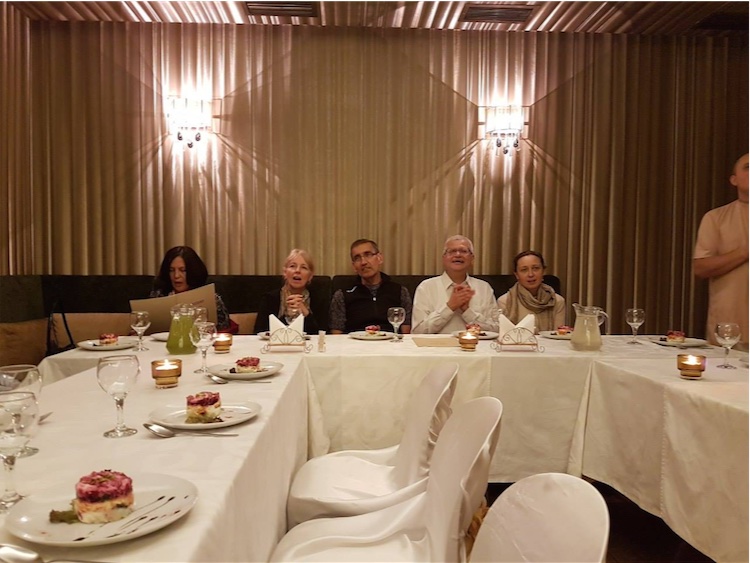Vaishnava Marriage Counselors Give First Seminars in Russia
By Madhava Smullen | Nov 11, 2016

Vaishnava marriage counselors Partha Das and Uttama Dasi were recently invited, under the recommendation of GBC Bhakti Vijnana Swami, to offer marital and premarital education to devotees in Moscow, Russia, for the first time.
The effort was an important service to the vast and fast-growing ISKCON Moscow community, who were grateful to learn practical advice and new paradigms.
Initiated by Srila Prabhupada in 1973, husband and wife Partha and Uttama have an incredible amount of experience and wisdom between them. They’ve been happily married for forty-five years, have premarital education training certified by Prepare and Enrich, and have offered that education with the Grihasta Vision Team – a group of professional devotee counselors – for the past decade.
In their native Canada, they also provide a mandated five-session premarital education course for all couples getting married at ISKCON temples.
“We were able to convince the leadership across the country that we don’t want to just perform marriages anymore – we actually want to support and nurture marriages,” says Partha. “We’re trying to create a culture where premarital education is an integral part of marriage in ISKCON.”
Visiting Moscow from October 7th to 20th, the couple offered an abbreviated version of their two-day seminar, Strengthening the Bonds That Free Us, which they’ve taught in eleven countries.
Their stay, organized by Ekanga Dasi, included four evening sessions. Audiences up to sixty men and women attended, both married and unmarried.
During the sessions, Partha and Uttama taught their 12 Principles and Values of a Successful Krishna Conscious Marriage, such as alignment with Srila Prabhupada, spiritual growth and progress, mutual respect and appreciation, open and honest communications, focus on children’s welfare, family love and affection, and regulated, balanced and exemplary lifestyle. (read the full list here: http://vaisnavafamilyresources.org/wp-content/uploads/2015/05/12_Principles-brochure-2012.pdf)
They also spoke about negotiating roles between husband and wife, gender differences, preparing for marriage, and communication skills.

Partha and Uttama with Moscow newly-weds
In preparation for marriage, they advised devotees to develop good qualities within themselves, and to look for certain qualities in prospective partners. They emphasized looking for someone who is kind first and foremost; as well as balanced, respectful, a good listener, humble, faithful to the Supreme Lord, free from addictions, and compatible.
“It’s important that you look for someone with similar values, personality and lifestyle,” says Uttama. “For instance, someone who shares your work ethics, family values, and the way you practice Krishna consciousness.”
Of course, she acknowledges, it is fine and natural to have small differences in values, and couples should support and encourage each other in these areas for a healthy marriage.
Partha and Uttama also emphasized getting to know a prospective partner well before trusting them, and making sure you trust them before you commit.
The communication skills part of the course, meanwhile, was largely based upon two of Rupa Goswami’s six loving exchanges between Vaishnavas: revealing one’s mind in confidence, and inquiring confidentially, or reworded here as “listening in confidence.”
“We’re trying to help devotees realize how important that exchange is, especially in household life,” says Partha. “We teach simple communication techniques that keep dialog from escalating into the modes of passion and ignorance where people end up having arguments, or isolating themselves in the relationship.”
Partha and Uttama feel that Krishna conscious marriage done right is something very special. If we truly stayed aware that Krishna is being worshipped in our homes, and is in our spouse’s hearts, they explain, we would never use unkind words or treat them harshly.
The counselors also talked about negative paradigms sometimes touted in ISKCON that cause damage. “One is the misunderstanding that your marriage and your children are not devotional service,” says Uttama. “Because then devotees don’t work on their relationships, minimize them, and sometimes don’t even meet their children’s needs.”

Partha and Uttama at a young devotee couples’ wedding, with Bhakti Vriksha leaders Angira Muni Das and Kaveri Dasi
Happy, caring marriages and family lives are devotional service not only because our children and spouses are devotees, Partha adds, but because the general public observes how devotees live and conduct themselves. “So just having a good marriage is a big contribution to Prabhupada’s movement – what to speak of having happy, well-adjusted, protected children.”
Another area commonly misunderstood that Partha and Uttama made an important distinction between is the difference between Vedic marriage – where the wife is often seen as subservient to the husband – and Vaishnava marriage.
In this connection, they cited an article on Vaishnava marriage by Srila Bhaktisiddhanta Sarasvati in his magazine The Harmonist. “The cardinal principle of grihasta ashram is that no one may be the owner of any property or service of another,” he writes. Everyone is only a servant whose activities are ever in the service of the Lord.”
He continues, “Marrying and giving in marriage do not give rise to any rights of a master either to the husband or to the wife. Men and women are joined in wedlock for the purpose of serving each other in the performance of the joint service of Krishna. The wife is not an object of enjoyment of the husband, nor vice versa. They do not marry for gratifying their sexual appetites. They marry for pleasing the Lord, not for pleasing themselves.”
He concludes, “Neither the husband nor the wife should claim the services of his or her partner on their own account. Both of them are only to offer their services if and when their partner is pleased to permit them to share their service of Hari. None of them can force their partners to serve them….This system of household discipline has its roots in the joint worship of the household deity by all members of the household.”
The seminar was received with gratitude by Russian devotees. It contributed to two main needs: providing knowledge on what was required to keep a marriage healthy and happy; and correcting neophyte understandings by new devotees.
“ISKCON Moscow is expanding so quickly,” says Partha Das. “The preaching there is amazing. There are thousands of devotees in Moscow, 100 different Bhakti Vriksha programs, and the temples are full of people dancing and chanting at every morning program.”
“But the challenge that goes with that is, growing very quickly means you have large numbers of neophyte devotees. So in Russia they are going through a lot of the same things now that other parts of ISKCON went through in the 1970s and early ‘80s. There are devotees with not so much maturity preaching whose intent is good, but who might not be always giving the best advice and information. For instance, that everything Vedic is automatically Vaishnava.”
Partha and Uttama deeply appreciate that the Moscow devotees are sincerely looking for ways to strengthen their families, and find it encouraging to see that their ISKCON leadership cares about the devotees and wants to help them have healthy marriages.
The couple plan to return in April to offer their full Strengthening the Bonds That Free Us course at a Moscow Grihasta Retreat, and to train select couples to give premarital education to others. In this way and others, they’ll help Russian devotees design their marriage and family support network, and get good role models.
Next, Partha and Uttama are working on preparing an online version of their course that will be offered to everyone soon through Belgium’s Bhaktivedanta College website.
Preparing as well as taking the course takes time and effort – but so does having a healthy and happy marriage, they remind us.
“Sometimes devotees look for an easy fix, saying, ‘Can you give us your blessings?’” Partha says. “But our blessings are to tell them, ‘Marriage doesn’t make you happy, it makes you married. And once you’re married, then you can do the hard work of becoming Krishna conscious and happy in your marriage. If you do the work, it is very satisfying. But you have to do the work.”















